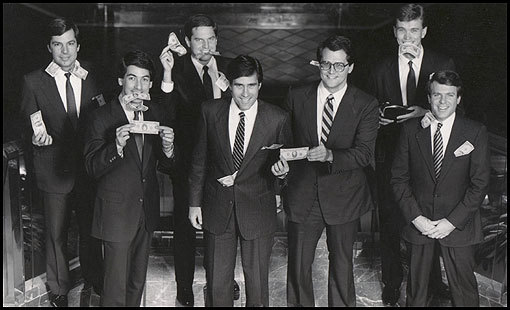With inequality growing, middle-class wages stagnant, lower-class wages falling, record high corporate profits, and substantial high-end income growth, a presidential campaign centered on class is not out of the question. Mitt Romney — who almost perfectly embodies the greedy, privileged, Wall Street Banker stereotype — would be an incredible candidate for just such a campaign. Consider the following things about Romney:
- Mitt Romney ran a private equity firm that bought out companies and laid off scores of workers while extracting tens of millions of dollars in debt-financed dividends.
- Mitt Romney admitted to paying around a 15 percent tax rate on his income because most of it comes from capital gains. The capital gains Mitt Romney collects as his main income are not subject to payroll taxes either. Despite having much lower incomes than Romney, middle-class families pay anywhere from 15 to 25 percent marginal tax rates on top of a 7.65 percent employee-side payroll tax rate.
- Mitt Romney remarked that in addition to his primary income source — capital gains — he makes some money from speaker fees but “not very much.” That “not very much” turns out to be $360,000 per year, or more than 7 times the median household income. Romney’s understanding of “not very much” will probably not resonate with most people.
- Mitt Romney accuses those who talk about inequality as participating in the bitter politics of envy, and suggests that it is only appropriate to talk about inequality in quiet rooms, i.e. not publicly. With half of Americans reporting that they are worse off financially now than a year ago, accusations that discussions of economic inequality are merely envy could alienate those who are suffering.
- Mitt Romney’s father, George Romney, was a rich businessman and governor of Michigan. Romney’s rise to success then is hardly the kind of motivational rags-to-riches story that the defenders of inequality so often hide behind.
In a society that increasingly recognizes the growing class tensions between the haves and the have-nots (a full 66% of Americans think there are strong conflicts between the rich and the poor), Romney’s almost cartoonish amount of wealth, his previous jobs, and his out-of-touch statements could become a huge liability for his campaign. After forty years of the benefits of productivity increases going exclusively to the top ten percent of earners, Wall Street wrecking the economy via the housing bubble, and hundreds of billions in unpopular Wall Street bailouts, the last thing most Americans probably want is a candidate like this:
